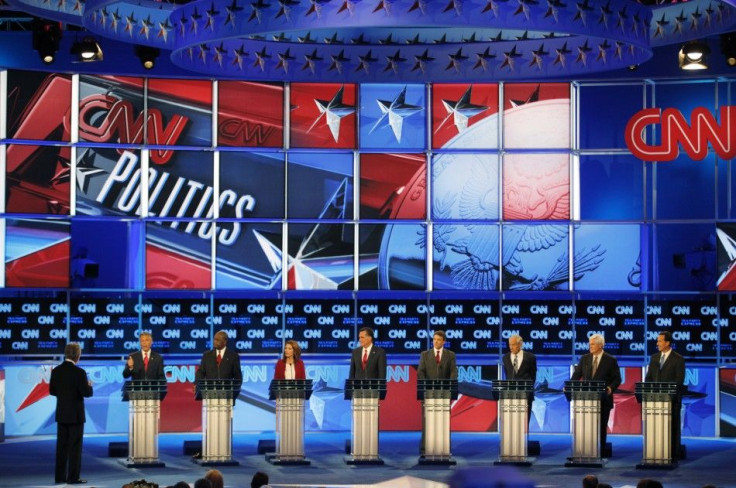Republican Debate: Presidential Candidates Rushing to 'Out-Conservative' Opponents
COLUMN

In the Republican presidential primaries, outdoing your opponents really means out-conservativing them.
Republican voters have moved noticeably to the right since the last presidential election in 2008, but the candidates have taken it further, pushing one another aside in their rush to establish themselves as the real conservative of the pack -- even though polls show that most Americans support higher taxes on the wealthy, legal abortion and other policies that have become taboo in this campaign.
At the most recent Republican debate, which was held on Thursday in Orlando, Fla., Michele Bachmann urged conservative voters not to settle for anything less than a strong constitutional conservative candidate.
Every four years, conservatives are told that we have to settle. It's anybody but Obama -- that's what we're hearing this year. I don't think that's true, she said. We need to choose a candidate who represents conservatives and constitutional conservative positions.
That's reasonable, but how does she define settling? If voters elected Rick Perry -- who is staunchly conservative on nearly every issue but has a small handful of tarnished spots on his record, like his support for a mandatory HPV vaccination program in Texas -- would that be settling? Or what if voters elected a staunch libertarian like Ron Paul? Would that be settling?
Ideologically-Narrow GOP Field
There isn't much settling left to be done in this race, because the choice is between degrees of conservatism, not between conservatism and centrism. And with every day that goes by, the gaps between the candidates continue to narrow as they cram themselves into the rightmost wall -- and then try to break through it.
This new reality was on full display in the debate on Thursday, when, for instance, Newt Gingrich proposed shrinking the Department of Education, and then Michele Bachmann took it further by saying she would repeal the entire federal education law and eliminate the federal Department of Education altogether.
Then there was the debate over whether President Obama is a socialist, which wasn't really a debate per se because the answer was assumed to be yes.
Mitt Romney dodged the question at first, saying the only title he wanted to give Obama was former President Barack Obama. Then he continued: What President Obama is, is a big-spending liberal, and he takes his political inspiration from Europe and from the socialist democrats in Europe. Guess what? Europe isn't working in Europe.
The United States is in no danger whatsoever of becoming a European social democracy, but it is true that Obama supports certain social-democratic tenets -- for example, a larger government role in guaranteeing benefits like health care and retirement funding. Interestingly, Romney was careful to say socialist democrats rather than social democrats, which is the correct term given that social-democratic theory differs substantially from pure socialism. But his argument can basically stand on its feet.
Candidates View Almost Any Moderate Stance as 'Socialism
Newt Gingrich, however, was not content to call Obama a social democrat. Instead, he tried to one-up Romney, accusing Obama of socialist policies, class warfare and bureaucratic socialism.
The truth is, there is an enormous difference between the European social-democratic model (e.g., Sweden, France or the Netherlands) and the bureaucratic socialist model (e.g., the Soviet Union, North Korea and Cuba). It is perfectly reasonable to oppose both of them -- but no one can ever be both a social democrat and a bureaucratic socialist, as Gingrich alleges, because the two are mutually exclusive.
But in the context of the rightward shuffle, it's a common practice to make sweeping epithets out of terms with precise definitions.
Even Jon Huntsman, who started out as the most moderate of the candidates and probably still is, has been trying to prove that he can do the out-conservative tango with the rest of them. For example, when Fox News' Megyn Kelly asked him whether he could see himself siding with the 66 percent of Americans who support a tax increase for millionaires, Huntsman responded, We're not going to raise taxes. This is the worst time to be raising taxes, and everybody knows that.
Clearly, everybody doesn't know that, if two-thirds of Americans support raising taxes for millionaires. But the non-negotiable conservative position is no new taxes, so that's the position he took.
There are very important debates to be had about what the right direction for the country is, whether Obama's policies are desirable or whether conservative policies would be better. But most of the Republican candidates are not having that debate. They are stuck in an entirely separate debate, one in which Obama's policies are sinister straw men with no nuance and the only questions are whether to cut the Department of Education in half or to eliminate it entirely, or whether to reduce taxes or to do away with the whole tax code.
That is out-conservativing, and it is far more threatening than anything Obama has proposed.
© Copyright IBTimes 2025. All rights reserved.





















